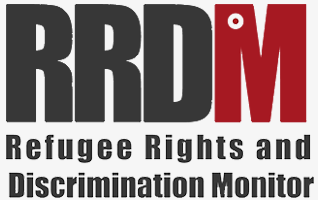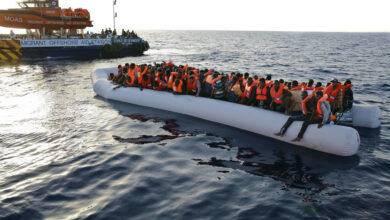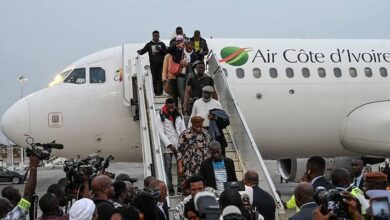Pope, calling migrants’ exclusion ‘criminal’
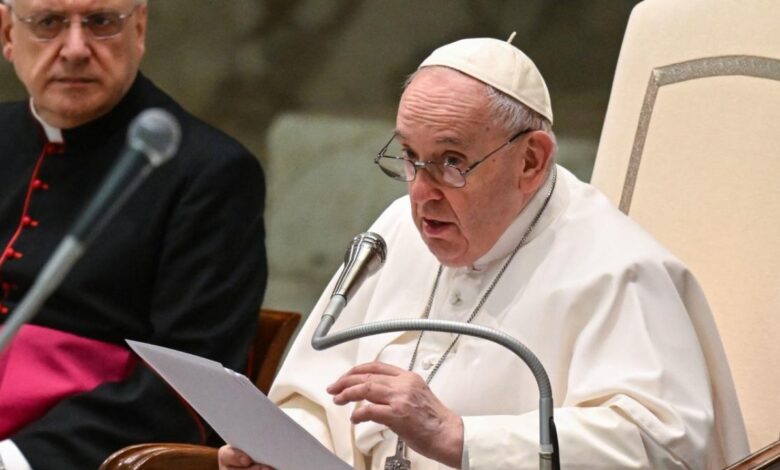
BY| ecre.org
Strong defense of migrants from Pope Francis as Giorgia Meloni expected to lead a far-right government coalition in Italy vows to crack down on immigration. Med5 countries float ideas of the European Border and Coast Guard Agency (Frontex) preventing departures from third countries. Despite efforts from civilian rescue operators, the cycle of deaths and distress on the Mediterranean routes continue.
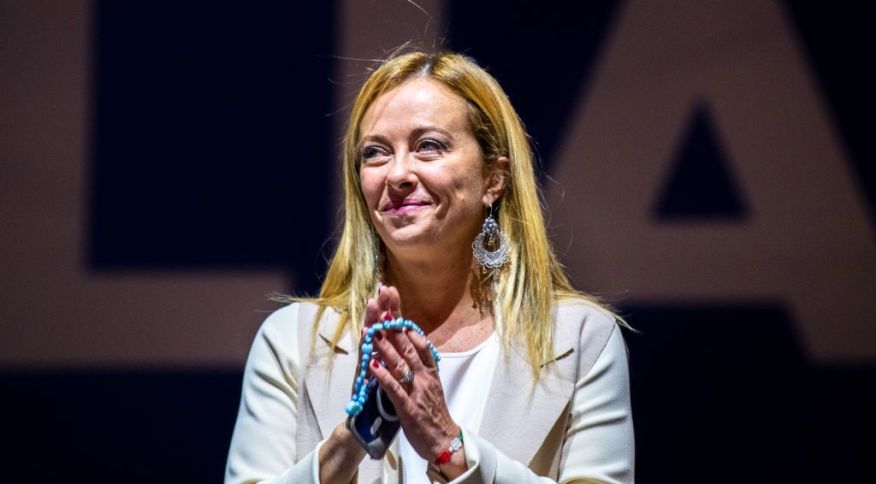
On 9 October, Pope Francis reiterated his strong defense of the rights of migrants, stating: “The exclusion of migrants is scandalous. Indeed, the exclusion of migrants is criminal. It makes them die in front of us,” adding: “And so today the Mediterranean is the world’s largest cemetery”. Meanwhile, Giorgia Meloni expected to become prime minister in
a potentially shaky far-right coalition vowed to crack down on immigration and tighten Italy’s borders including by accelerating returns, toughening asylum rules, and implementing a naval blockade of North Africa to prevent arrivals.
In advance of the European Council meeting in Luxembourg on October 14, the so-called Med5 countries of Cyprus. Greece, Malta, Italy and Spain are calling for an obligatory solidarity mechanism within the EU as well as increased monitoring and management of EU external borders. Reportedly, the Med5 countries also floated ideas of asylum application centers in neighboring third countries and Frontex deployments in third countries to stop departures. Cyprus Interior Minister, Nicos Nouris, further claimed that there is an abuse of the EU asylum system with some applicants falsely claiming they are at risk from countries such as Syria.
Meanwhile, civil society’s efforts to save lives continue. The NGO hotline for people in distress at sea, Alarm Phone, could celebrate its eighth year anniversary on 11 October, having assisted more than 5,000 boats in distress. ResQship‘s human rights monitoring ship Nadir carried out four rescue operations in the Mediterranean in just 48 hours over the weekend, saving the lives of 120 people in total since 7 October. Survivors were taken ashore by the Italian coast guard. MSF Sea carried out two rescue operations off Libya on 12 and 13 October saving nine and 122 people – including more than 90 children, respectively. According to the organisation, survivors are being cared for by medical staff aboard the Geo Barents rescue vessel. After requests for disembarkation of 48 survivors rescued from an overcrowded wooden boat on 4 October by Louise Michel rescue ship were ignored by Italian and other European maritime authorities, tensions were rising on deck by 7 October. Crew members told The Civil Fleet that the situation had escalated dangerously on 9 October with survivors jumping overboard: “Unfortunately, our captain had to declare a state of necessity yesterday evening,” they said, “as we could no longer guarantee the safety of our guests and our crew. According to the crew members: “We therefore decided to declare the state of necessity to enter port, even in the worst case without permission” adding: “But as we were approaching the harbour of Lampedusa, we finally got the official clearance to go in”.
However, despite civilian efforts, the death toll continues to rise with at least 1,200 lives lost in 2022. On 10 October, Tunisian fishermen recovered the bodies of eight people off the coast of the southern town of Zarzis, whose boat is believed to have sunk at the end of September. On the same day, three bodies were recovered south of Trapani, Italy – one man was rescued at sea and media local media believes the wrecked boat had departed from Tunisia. MSF Sea commented on the tragedy, asking: “3 more nameless victims of a shipwreck. How many more people will have to lose their lives before the EU – Italy and Malta – accepts responsibility for ensuring search and rescue operations in the Mediterranean Sea?”. That question remains open as Malta continues its tactics of non-response. On 10 October, Alarm Phone reported of 55 people in distress in Malta’s SAR zone with authorities unresponsive – the group was later rescued by Italian authorities 30 hours after the first alert. Alarm Phone thanked the Imara vessel operated by r42_sailandrescue, which was on the scene but unable to conduct a rescue due to weather conditions, for staying with the group until the rescue arrived. On the same day, Alarm Phone reported of another 37 people in distress in the Maltese SAR zone with authorities ignoring alerts and rescue to Italy conducted only the following day. The non-response by Malta can also lead to an interception and return. On 9 October Sea-Watch reported: “Yesterday, approximately 40 people, spotted in the Maltese search- and rescue area by our Seabird crew, were intercepted and pushed back to Libya by patrol boat 656 of the so-called Libyan coast guard. Another illegal pushback. The criminal policy of the EU continues”. On 9 October Alarm Phone reported of several boats in distress off Libya – one carrying 200 people who were likely intercepted and returned by the so-called Libyan Coast Guard after some reportedly fell into the water, and one carrying 100 people with the organisation, stating: “We were informed by the so-called Libyan coastguard that the majority of the people on this boat survived. Sadly, they also reported that several people went missing. Our condolences to the families and friends of the missing people. Europe’s borders continue to kill”.
The EU’s cooperation with and support for Libya – notorious for abuse of migrants and violations of human rights – has again come under scrutiny. Based on a complaint filed by Privacy International, Access Now, Sea-Watch, BVMN, Homo Digitalis, and the International Federation for Human Rights (FIDH) the European Ombudsman has opened an inquiry into several aspects of Frontex’s co-operation with Libya including training support on maritime law enforcement operations to the Libyan General Administration for Coastal Security (GACS) as well as on Frontex’s aerial surveillance in the Central Mediterranean Sea in cooperation with the so-called Libyan Coast Guard. Berenice Gaudin from Sea Watch, stated “Our message is clear: we are watching and we will continue to fight Frontex’s border practices through all possible legal ways,” adding: “For the past years, we have been witnessing Frontex’s inhumane co-operation with the so-called Libyan Coast Guard which led to illegal pullbacks of thousands of individuals to Libya”. Further, Civil society organisations have announced an “International action day against the renewal of the Italy-Libya Memorandum” with actions across Europe. According to the organisers: “In all Europe, cities will take to the streets and demand that the Italian government and EU put an end to this illegal and shameful agreement between Italy and Libya. Anybody who have any kind of power have to use it to cancel the renewal of this cruel agreement which allows the illegal interception and pullbacks of people on the move by the so-called Libyan coast guard, followed by torture, extortion, rape and even murder in Libyan detention centres”.
On 7 October, Libyan authorities recovered 15 bodies washed up onshore after a fire on refugee boat – most of them burned. A Libyan NGO, The International Organization for Cooperation and Emergency Aid, reported that the 15 migrants had been killed by people smugglers who shot them and then set fire to their vessel. The United Nations Support Mission in Libya (UNSMIL) stated it: “strongly condemns the heinous killing on Friday morning of at least 15 migrants and asylum-seekers in Sabratah. Eleven charred bodies were found inside the docked boat with a further four wounded bodies found outside” adding “While the exact circumstances remain to be determined, the killings reportedly resulted from armed clashes between rival traffickers. UNSMIL calls on Libyan authorities to ensure a swift, independent and transparent investigation to bring all perpetrators to justice”.
16,627 people had “disembarked on Libyan shores” in 2022 as of 1 October, according to the International Organization for Migration IOM Libya. The majority of these people would have been intercepted and returned by the so-called Libyan Coast Guard that is funded and trained by the EU and its member states.
